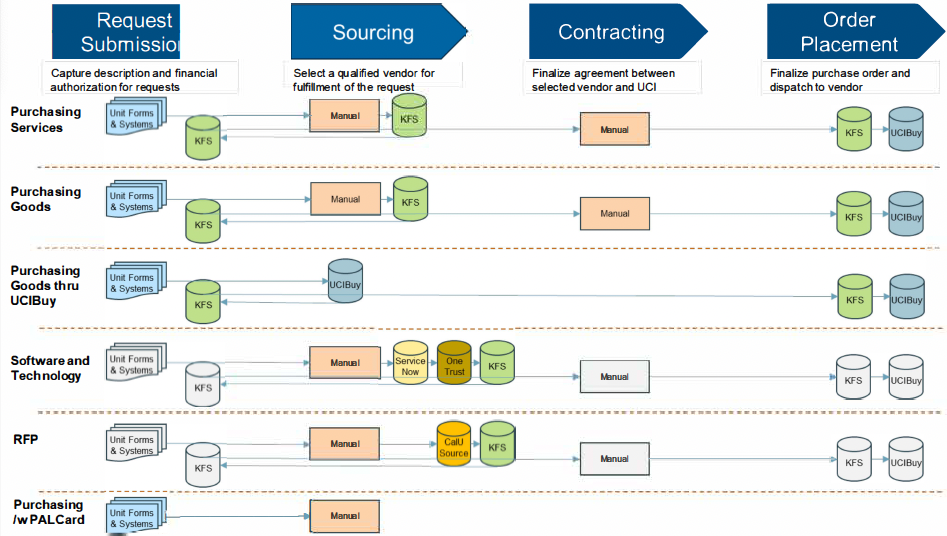This portion of the project focuses on migrating existing KFS (REQ/PO) functionality to UCIBuy+ which is powered by Jaggaer.
Project Goals and Desired Outcomes
|
Improve Customer Experience |
Increase Process Efficiency |
Maximize Procurement Savings |
|||
| Simplify forms and reduce need for specialized knowledge to submit requests | Reduce PO processing time | Redirect spend from non-contracted to contracted suppliers | |||
| Clearly communicate compliance requirements and streamline user guidance | Reduce non-value-added work and errors by automating workflow and standardizing processes | Realize cost savings with lower negotiated prices | |||
| Improve visibility into transaction and workflow status | Reduce dollar per PO cost | Leverage free shipping for most contracted suppliers | |||
Target and actual measures to be determined.
![]()
New Features
- Expansion of UCIBuy to process non-catalog REQs and POs
- User-friendly interface improvements (advance catalog shopping, hints and tips, simplified order entry)
- Enhanced ability to track REQ & PO requests
- Allow REQ send back for corrections instead of canceling
- Incorporate compliance requirements in REQ workflow
- Transition exceptional PALCard approvals to Jaggaer
![]()
Unaffected Systems & Documents
- PALCard Reconciliation (PCDO); Contract Authoring & Execution; Equipment Inventory Management
- Payment of invoices in KFS; PREQ, CM, DV, TEM*
- Vendor onboarding (PaymentWorks)*
- Interdepartmental/Unit Facilities Recharges*
Status
Project Started:
January 24, 2023
Project Phase:
Discovery (April 1–Aug. 31, 2023)
Analysis (Sept. 5–Nov. 30, 2023)
Design (Dec. 1, 2023–June 30, 2024)
Implementation (July 1, 2024–Present)
Last Updated:
02/09/2026
Communities Affected:
Campus schools, divisions, and medical center (equipment/asset purchases)
Key Stakeholders:
Client: Campus faculty & staff
Sponsor: Mary Lou D. Ortiz, CFO & Vice Chancellor, Division of Finance & Administration
Steering Committee Chair: Rick Coulon, Sr. Associate Vice Chancellor, Division of Finance & Administration
Business Process Owner: Snehal Bhatt
Project Manager: Beatrix Regasz
Project Team: More info
E2E Project Team Resources
SharePoint site is only accessible
to the project team.
 Discovery (April 1-August 31, 2023)
Discovery (April 1-August 31, 2023)
The purpose of the discovery phase is to define the project scope; capture current state processes; collect stakeholder feedback; identify pain points and issues; identify policy and external constraints; and assess management processes and measures.
Current State
Stakeholder Feedback, Pain Points, & Issues
Comments generated by customer concerns. A survey was conducted post discovery phase which validated the findings below.
| "Rules and procedures are not well documented and require tribal knowledge." |
| "Risk reviews being required even for renewing existing contracts." |
| "Requesters forced to follow-up multiple times and chase seemingly arbitrary or inconsistent compliance rules." |
| "Hard to find valid commodity codes and objects codes and not clear who to ask for help." |
| "Urgent requests delayed because of lengthy review and compliance requirements." |
| "PO sat in pending status for weeks without follow-up or communication from Purchasing." |
| "Software review process is too lengthy and overly burdensome." |
| "Too many steps and duplicate forms even for small dollar purchases." |
| "UCIBuy orders below $500 should be pre-approved and not require Fiscal Officer approval." |
Key Themes
Key themes resurfaced throughout Discovery process, indicating possible root causes and emerging solution areas.
![]()
Lack of Integration Across Systems
Numerous systems are used to facilitate the end-to-end purchasing processes and most of these systems are not integrated, meaning critical information is not passed along to the right users at the right time.
![]()
Unstructured and Fragmented Workflows
Purchasing processes are highly fragmented among different teams and technologies, requiring manual and redundant coordination to link the various steps.
![]()
Inadequate Monitoring and Support
Intake and sourcing is mostly done offline from central systems, and no specific role is responsible for actively monitoring transactions and resolving exceptions.
![]()
Insufficient Role Clarity
Multiple steps in the process can be undertaken by various roles, leading to uncertainty for the requester about whom to involve, or involving individuals without the necessary training or information to fulfill expected tasks.
![]()
Poor End User Experience
End users stuck between local and central processes, have no visibility to track status of their requests, lack clarity on required action items, and have no clear expectation on time to completion for their requests.
![]()
Impractical Knowledge Management
Essential process and policy details are mainly housed on the Procurement website, yet they lack organization based on user roles or clear links to specific processing steps or systems, making them less accessible during transactional processing.
 Analysis (September 5-November 30, 2023)
Analysis (September 5-November 30, 2023)
The purpose of the analysis phase is to clarify roles, authorities, and org structures; establish object view of process strengths and weaknesses relative to ideal state; and identify root causes and solution options.
Steps
- Finish collecting current process data.
- Define ideal state models for each tiger team domain.
- Inventory requirements by looking at gaps relatives to ideal state.
- Prioritize requirements based on impact on customer service and performance.
- Understand and validate root cause for high priority requirements.
 Design (Dec. 1, 2023-June 30, 2024)
Design (Dec. 1, 2023-June 30, 2024)
The purpose of the design phase is to define an optimal and practical future state.
Steps
- Selected Jaggaer as the vendor to develop workflow to assist with high impact challenges.
-
Developed ideal future state map for technical team to use for integration.
-
Document required changes for selected solutions.
-
Plan implementation of changes.
 Implementation (July 1, 2024 to present)
Implementation (July 1, 2024 to present)
Implementation is underway with a go-live anticipated for April 13, 2026.
Steps
- UC Irvine’s technical team is collaborating with Jaggaer’s project team to define configuration and integration requirements.
- The change management team is developing training and communication materials for various stakeholders.
- Post-launch performance will be monitored, with support and adjustments provided as necessary.




